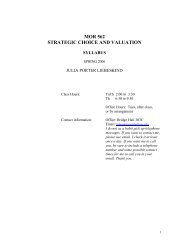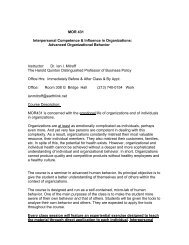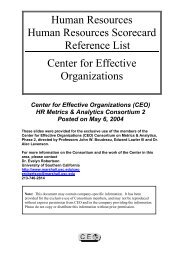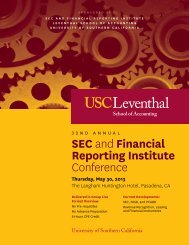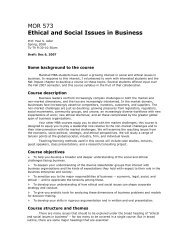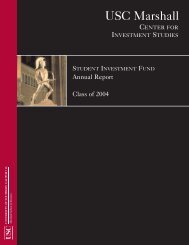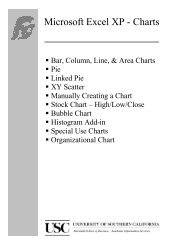finance and business economics - USC Marshall - University of ...
finance and business economics - USC Marshall - University of ...
finance and business economics - USC Marshall - University of ...
Create successful ePaper yourself
Turn your PDF publications into a flip-book with our unique Google optimized e-Paper software.
FINANCE ANDBUSINESS ECONOMICSSenior Concentration Elective Course GuideSpring 2009November 11, 2008
Business Economics ConcentrationThis concentration is attractive to students seeking careers in fields that require economic analysis. Analysts inmany consulting firms - such as <strong>business</strong>, management, litigative, valuation, strategy <strong>and</strong> compensation - use suchskills extensively. It is also helpful for students pursing financial analysis, research, strategic planning or analyticalpositions for <strong>business</strong> or government, or are considering advanced pr<strong>of</strong>essional degrees such as law or graduatestudy in <strong>economics</strong>, <strong>finance</strong>, or other fields. Courses feature a thorough exposure to issues in applied <strong>economics</strong>,policy analysis, <strong>business</strong> <strong>and</strong> <strong>finance</strong>, valuation <strong>and</strong> law. This concentration emphasizes the economic <strong>and</strong> legalunderpinnings <strong>of</strong> today's <strong>business</strong>es <strong>and</strong> the development <strong>and</strong> application <strong>of</strong> computer-based econometric <strong>and</strong>forecasting models.Required courses for this concentration:NoneSelect FOUR courses for this option:BUAD 350BUAD 351FBE 324FBE 402FBE 403FBE 416FBE 421FBE 428mFBE 429FBE 433FBE 443FBE 445FBE 462FBE 464Macroeconomic Analysis for Business DecisionsEconomic Analysis for Business DecisionsThe Financial SystemGovernment <strong>and</strong> BusinessLegal Environment <strong>of</strong> BusinessManagerial EconomicsFinancial Analysis & ValuationPrinciples <strong>of</strong> Employment LawInternational Business LawCompensation, Incentives, <strong>and</strong> Corporate GovernanceIntroduction to Forecasting <strong>and</strong> Risk AnalysisTopics in Economic Analysis <strong>of</strong> Business Strategy <strong>and</strong> PolicyInternational Trade <strong>and</strong> Commercial PolicyInternational FinanceCorporate Finance ConcentrationThe Corporate Finance Concentration prepares students for careers in financial management as corporate treasurers,financial analysts, money managers, <strong>and</strong> commercial <strong>and</strong> investment bankers. The courses in the Corporate FinanceConcentration apply to the central principles <strong>of</strong> <strong>finance</strong>– net present value, market efficiency, agency costs,incremental cash flow, information asymmetries, adverse selection, arbitrage, modern portfolio theory, capital assetpricing, option pricing, <strong>and</strong> sustainable growth –to better underst<strong>and</strong> the practice <strong>of</strong> <strong>finance</strong> in financial <strong>and</strong> nonfinancialfirms. Topics covered include the valuation <strong>of</strong> securities, portfolio management, the choice <strong>of</strong> debt versusequity, dividend policy, the analysis <strong>of</strong> investment projects, mergers <strong>and</strong> acquisitions, financial restructuring,management <strong>of</strong> working capital, <strong>and</strong> financial analysis.Required courses for this concentration:NoneSelect FOUR courses for this concentration:FBE 421 Financial Analysis <strong>and</strong> ValuationFBE 425 Management <strong>of</strong> Financial InstitutionsFBE 429 International Business LawFBE 431 Financial Policies <strong>and</strong> Corporate ControlFBE 432 Corporate Financial StrategyFBE 433 Compensation, Incentive, <strong>and</strong> GovernanceFBE 435 Applied Finance in Fixed Income SecuritiesFBE 436 Financial Management <strong>of</strong> Multinational CorporationsFBE 437 Entrepreneurial Finance: Financial Management <strong>of</strong> Developing FirmsFBE 458 Law <strong>and</strong> FinanceFBE 459 Financial DerivativesACC 415x Intermediate Financial Accounting for Non-Accounting Majors3
Financial Analysis & Valuation ConcentrationThe financial analysis <strong>and</strong> valuation concentration will <strong>of</strong>fer <strong>Marshall</strong> undergraduate students’ intensive instruction<strong>and</strong> training to prepare for careers in financial analysis <strong>and</strong> valuation, including positions in global financialinstitutions such as hedge funds <strong>and</strong> portfolio management firms <strong>and</strong> commercial <strong>and</strong> investment banks.Required courses in the financial analysis <strong>and</strong> valuation concentration are <strong>of</strong>fered jointly through the Finance <strong>and</strong>Business Economics Department <strong>and</strong> the Leventhal School <strong>of</strong> Accounting <strong>and</strong> focus on advanced principles infinancial accounting, financial reporting, financial analysis <strong>and</strong> valuation <strong>and</strong> corporate financial strategy. Theory<strong>and</strong> cases are used to underst<strong>and</strong> the practice <strong>of</strong> <strong>finance</strong> <strong>and</strong> accounting in financial <strong>and</strong> non-financial firms.Accounting topics include corporate financial reporting, financial statement analysis, information disclosures relatedto complex securities, mergers <strong>and</strong> acquisitions, <strong>of</strong>f-balance sheet financing <strong>and</strong> stock options. Finance topicsinclude the valuation <strong>of</strong> companies, management decision making related to capital structure, capital raising,mergers <strong>and</strong> acquisitions, financial restructuring, management <strong>of</strong> working capital, <strong>and</strong> other strategic alternatives forcompanies in search <strong>of</strong> growth opportunities <strong>and</strong> shareholder value.Required courses for this concentration:FBE 421ACC 415xACC 416ACC 417xFinancial Analysis <strong>and</strong> ValuationIntermediate Financial Accounting for Non-Accounting MajorsFinancial Reporting & AnalysisAdvanced Financial Accounting for Non-Accounting MajorsSelect ONE course for this concentration:FBE 431FBE 432Financial Policies <strong>and</strong> Corporate ControlCorporate Financial StrategyAdmission Materials & RequirementsConcentration declaration forms for the Undergraduate Certificate Program in Financial Analysis <strong>and</strong> Valuation canbe obtained from Academic Advising in <strong>Marshall</strong> Undergraduate Student Services in BRI-104.The following MUST be included with the application:• Official transcripts with at least a 3.50 GPA out <strong>of</strong> 4.0 scale <strong>and</strong> at least a “B+” course grade in : BUAD 250A,BUAD 250B or BUAD 305, BUAD 306 <strong>and</strong> BUAD 310.• Transfer students must include their college transcript which shows a grade <strong>of</strong> A for both transferred introductoryaccounting courses.CreditAt the completion <strong>of</strong> the program, the certificate will be awarded to students who obtain a minimum GPArequirement <strong>of</strong> 3.70 or higher in the Certificate’s required courses taken at the <strong>USC</strong> <strong>Marshall</strong> School <strong>of</strong> Business.For additional information, please contact Helen Pitts at hpitts@marshall.usc.edu or (213) 740-6554.4
General Financial Management ConcentrationThe General Financial Management Concentration will prepare students for positions as financial analysts incorporations, investment banking firms, commercial banks, consulting firms, money management firms, <strong>and</strong> a wideset <strong>of</strong> other <strong>business</strong> enterprises.Students who successfully complete this concentration will have an underst<strong>and</strong>ing <strong>of</strong> "real world" institutionaldetails, <strong>finance</strong> principles, <strong>and</strong> accounting information that will enable them to structure <strong>and</strong> execute conceptuallysophisticated cash flow <strong>and</strong> valuation analysis for a broad range <strong>of</strong> <strong>finance</strong> applications. They will be able to usefinancial data to analyze companies in a conceptual framework that recognizes the critical role <strong>of</strong> <strong>business</strong> strategyin determining company value. Not only will students be well versed in quantitative techniques, but they will alsohave an appreciation for the limitations <strong>of</strong> those techniques in the complex <strong>and</strong> changing <strong>business</strong> world.This option consists <strong>of</strong> four advanced (<strong>and</strong> complementary) courses that will develop financial analysis skillssubstantially beyond the level <strong>of</strong> BUAD 306. To complete this option, students must take at least four <strong>of</strong> thecourses listed below <strong>and</strong> earn a grade <strong>of</strong> C or better in each.Select at least TWO <strong>of</strong> the following courses (Required):FBE 421 Financial Analysis <strong>and</strong> ValuationFBE 429 International Business LawFBE 431 Financial Policies <strong>and</strong> Corporate ControlFBE 432 Corporate Financial StrategyFBE 435 Applied Finance in Fixed Income SecuritiesFBE 441 InvestmentsFBE 446 Advanced Topics in Portfolio Management <strong>and</strong> InvestmentSelect up to TWO <strong>of</strong> the following courses for this concentration:FBE 324 The Financial SystemFBE 425 Management <strong>of</strong> Financial InstitutionsFBE 428m Principles <strong>of</strong> Employment LawFBE 433 Compensation, Incentive, <strong>and</strong> GovernanceFBE 436 Financial Management <strong>of</strong> Multinational CorporationsFBE 437 Entrepreneurial Finance: Financial Management <strong>of</strong> Developing FirmsFBE 440 Trading <strong>and</strong> ExchangesFBE 458 Law <strong>and</strong> FinanceFBE 459 Financial DerivativesFBE 462 International Trade <strong>and</strong> Commercial PolicyFBE 464 International FinanceFBE 470 Advanced Real Estate AnalysisFBE 489 Real Estate Capital MarketsACC 415x Intermediate Financial Accounting for Non-Accounting MajorsA total <strong>of</strong> FOUR courses is required for this concentration.5
Investments <strong>and</strong> Financial Markets ConcentrationInvestments <strong>and</strong> Financial Markets Concentration provides training for students interested in careers in portfoliomanagement, securities trading, <strong>and</strong> institutional <strong>and</strong> retail securities sales (brokerage). Investments <strong>and</strong> financialmarkets courses develop specific skills for analyzing <strong>and</strong> implementing investment strategies <strong>and</strong> for analyzingspecific classes <strong>of</strong> securities. This training establishes basic principals governing the performance <strong>of</strong> securitiesmarkets <strong>and</strong> is excellent background for all careers involving raising or investing corporate or government funds.Required course for this concentration:FBE 441 InvestmentsSelect THREE additional courses for this concentration:FBE 324 The Financial SystemFBE 421 Financial Analysis <strong>and</strong> ValuationFBE 425 Management <strong>of</strong> Financial InstitutionsFBE 435 Applied Finance in Fixed Income SecuritiesFBE 440 Trading <strong>and</strong> ExchangesFBE 443 Introduction to Forecasting <strong>and</strong> Risk AnalysisFBE 446 Advanced Topics in Portfolio Management <strong>and</strong> InvestmentFBE 459 Financial DerivativesFBE 464 International FinanceReal Estate Finance ConcentrationThe Real Estate Finance Concentration involves the application <strong>of</strong> <strong>business</strong> decision-making tools in the real estateindustry. Emphasis is placed on economic <strong>and</strong> financial analysis <strong>of</strong> issues in real estate markets including thoserelated to investment <strong>and</strong> development. You must take at least four courses.Required course for this concentration:FBE 391Real Estate Finance <strong>and</strong> InvestmentSelect up to ONE <strong>of</strong> the following courses for this concentration:FBE 324 The Financial SystemFBE 421 Financial Analysis <strong>and</strong> ValuationFBE 425 Management <strong>of</strong> Financial InstitutionsFBE 441 InvestmentsFBE 459 Financial DerivativesPPD 435 Analyzing Real Estate Markets for Planning <strong>and</strong> DevelopmentSelect at least TWO <strong>of</strong> the following courses (Required): (For a total <strong>of</strong> THREE elective courses.)FBE 427 Real Estate LawFBE 466 Management <strong>of</strong> Real Estate Development: Feasibility StudiesFBE 470 Advanced Real Estate AnalysisFBE 489 Real Estate Capital MarketsA total <strong>of</strong> FOUR courses is required for this concentration - - one required course + three elective courses.6
Real Estate & Construction Management ConcentrationReal Estate <strong>and</strong> Construction Management Concentration is designed for students interested in construction <strong>and</strong>project management aspects <strong>of</strong> the real estate development process. Course work includes upper division courses inconstruction engineering <strong>and</strong> management from the Civil Engineering DepartmentRequired courses for this concentration:FBE 391FBE 466FBE 470CE 460Real Estate Finance <strong>and</strong> InvestmentManagement <strong>of</strong> Real Estate Development: Feasibility StudiesAdvanced Real Estate AnalysisConstruction Engineering (Civil Engineering Department)Select TWO additional courses for this option:FBE 427 Real Estate Law, orCE 412 Construction Law <strong>and</strong> the Property Development ProcessCE 461 General Construction EstimatingCE 462 Construction Methods <strong>and</strong> EquipmentCE 472 Construction Labor ManagementReal Property Development ConcentrationDesigned for students interested in working at the nexus <strong>of</strong> real estate, architecture <strong>and</strong> urban planning. Coursework includes upper division courses or courses for non-majors in the School <strong>of</strong> Policy, Planning <strong>and</strong> Development<strong>and</strong> the School <strong>of</strong> Architecture.Required courses for this concentration:FBE 391 Real Estate Finance <strong>and</strong> InvestmentsFBE 466 Management <strong>of</strong> Real Estate Development: Feasibility StudiesFBE 470 Advanced Real Estate AnalysisSelect ONE additional course for this option:ARCH 106x Workshop in ArchitectureARCH 304x Intensive Survey: Prehistory to the PresentGEOG 281L Environmental Geographic Information Systems (Geography Department)PPD 417 History <strong>of</strong> Planning <strong>and</strong> Development (School <strong>of</strong> Policy, Planning, & Development)PPD 435 Analyzing Real Estate Markets for Planning <strong>and</strong> DevelopmentPPD 470 History <strong>and</strong> Development <strong>of</strong> CitiesSelect ONE additional course for this option:CE 460 Construction Engineering (Civil Engineering Department)FBE 427 Real Estate LawFBE 489 Real Estate Capital MarketsNotes:Undergraduates wishing to enroll in graduate courses for undergraduate credit must secure prior approval.(Graduate courses are numbered 500 <strong>and</strong> above.)Many <strong>of</strong> the courses in both <strong>of</strong> these options fulfill some <strong>of</strong> the course requirements for licensing in realestate brokerage <strong>and</strong> appraisal in the State <strong>of</strong> California.7
Senior Option Table – Spring 2009CONCENTRATIONSBusinessEconomicsCorporateFinanceFinancialAnalysis &ValuationGeneral FinancialManagementInvestments &FinancialMarketsReal EstateFinance(16 Units)Real Estate <strong>and</strong>ConstructionManagement(20-22 Units)Real EstateDevelopment(17-20 Units)NoneNoneChoose at least 2REQUIREDCoursesFBE 421ACC 415xACC 416 (2)ACC 417x (2)FBE 421FBE 431FBE 432FBE 441FBE 446FBE 441 FBE 391 FBE 391FBE 466FBE 470CE 460 (3)FBE 391FBE 466FBE 470Choose at least 4Choose 4Choose 1Choose up to 2Choose 3Choose 2Choose 2Choose 1ELECTIVECoursesBUAD 350BUAD 351FBE 324FBE 402FBE 403FBE 416FBE 421FBE 428mFBE 429FBE 433FBE 435FBE 443FBE 445FBE 462FBE 464FBE 421FBE 425FBE 429FBE 431FBE 432FBE 433FBE 435FBE 436FBE 437FBE 458FBE 459ACC 415xFBE 431FBE 432FBE 324FBE 425FBE 428mFBE 429FBE 433FBE 435FBE 436FBE 437FBE 440FBE 458FBE 459FBE 462FBE 464FBE 470FBE 489ACC 415x(TOTAL:at least 4 courses)FBE 324FBE 421FBE 425FBE 429FBE 435FBE 440FBE 443FBE 446FBE 459FBE 464FBE 427FBE 466FBE 470FBE 489Choose at least 1FBE 324FBE 425FBE 441FBE 459FBE 421PPD 435FBE 427 orCE 412 (3)CE 461 (3)CE 462 (3)CE 472 (2)ARCH 106x (2)ARCH 304 (4)GEOG 281L (4)PPD 417 (4)PPD 435 (4)PPD 470 (4)Choose 1CE 460 (3)FBE 427FBE 489Note: FBE 391 <strong>and</strong>/or FBE 421 may be taken in the student’s junior year if desired.8
UNDERGRADUATE ELECTIVE OFFERINGSFBE 391: Real Estate Finance <strong>and</strong> InvestmentUrban real estate resources, definitions <strong>and</strong> background; financial aspects <strong>of</strong> real estate markets <strong>and</strong> investments;urban <strong>and</strong> regional real estate markets <strong>and</strong> the development process.How do you classify various property rights? What is an escrow? How do you begin analyzing a real estateproject? Other topics covered include deeds <strong>and</strong> conveyances, sources <strong>of</strong> mortgage financing, principles <strong>of</strong>valuation <strong>and</strong> urban real estate structure <strong>and</strong> problems. This is an ideal introductory course providing students withan overview <strong>of</strong> real estate principles <strong>and</strong> practices. This is a prerequisite course for other real estate electives. (Thiscourse satisfies the "Principles" requirement for students interested in obtaining a California Salesperson's License.)Prerequisite: BUAD 306FBE 400x: Introduction to Real Estate Finance <strong>and</strong> DevelopmentCase analysis examining economic <strong>and</strong> financial aspects <strong>of</strong> real estate decisions for non-<strong>business</strong> majors. Focuseson dynamics <strong>of</strong> financing, markers <strong>and</strong> the development process. Open to all major. Not available for credit as asenior options course for <strong>business</strong> majors or for students in the real estate option. (Duplicates credit in former FBE200x)Prerequisite: NoneFBE 421: Financial Analysis <strong>and</strong> ValuationThis course develops <strong>and</strong> utilizes tools <strong>of</strong> financial analysis to evaluate the performance <strong>and</strong> assess the value <strong>of</strong>individual companies in an industry <strong>and</strong> strategic context. The course will cover various approaches or models forfinancial analysis <strong>and</strong> valuation. It will stress applied issues such as the choice among various terminal valueassumptions in valuation analysis, the relation between growth <strong>and</strong> valuation, <strong>and</strong> assessments <strong>of</strong> leverage thatincorporate <strong>of</strong>f-balance sheet financing. Students will learn to apply tools <strong>of</strong> financial analysis <strong>and</strong> severalvaluation methodologies to evaluate a company’s strategic <strong>and</strong> competitive positioning, financial performance, <strong>and</strong>strategic alternatives. The major emphasis will be on utilizing <strong>and</strong> interpreting financial data to improve financialdecision making. The applications we will cover in the course include enterprise <strong>and</strong> equity valuation in mergers<strong>and</strong> acquisitions, corporate restructurings, divestitures, management <strong>and</strong> leveraged buyouts, liquidations, <strong>and</strong> initialpublic <strong>of</strong>ferings <strong>of</strong> common stock, <strong>and</strong> the use <strong>of</strong> financial analysis to predict financial distress, dividend policychanges, <strong>and</strong> future financing requirements.Prerequisite: BUAD 306FBE 427: Real Estate LawBy taking this course students learn the theory <strong>and</strong> practical applications <strong>of</strong> substantive real estate law. All majortopics <strong>of</strong> real property law as well as current trends <strong>and</strong> issues will be addressed. Sufficient material is covered forpreparation for real estate license examinations. By the end <strong>of</strong> the course you will be familiar with the following:• Characteristics <strong>of</strong> American law by which property rights are created, controlled, collateralized <strong>and</strong> transferred• Extent <strong>of</strong> real estate interests including l<strong>and</strong>lord-tenant• Agency law <strong>and</strong> regulation <strong>of</strong> licenses• Acquisition contracts <strong>and</strong> conveyancing• Commercial <strong>and</strong> residential financing• Real estate development <strong>and</strong> financing• Construction law <strong>and</strong> remedies• Escrows <strong>and</strong> closing, including title insurance• Tax aspects <strong>of</strong> real estate ownership <strong>and</strong> transfers• Probate distributions• Public policy law <strong>and</strong> issues, including zoning <strong>and</strong> eminent domainPrerequisite: None9
FBE 428m: Principles <strong>of</strong> Employment LawThis course presents a comprehensive treatment <strong>of</strong> employment <strong>and</strong> labor law topics. The course commences with areview <strong>of</strong> the common law governing the employment relationship <strong>and</strong> proceeds to address the significant federal<strong>and</strong> state laws <strong>and</strong> regulations affecting that relationship. The course coverage includes the rights <strong>and</strong>responsibilities <strong>of</strong> private, unionized <strong>and</strong> public sector employers. Special emphasis is placed upon emerging <strong>and</strong>growing enterprises wherein legal liability, retention, <strong>and</strong> human resources issues have become increasinglycomplex. Issues relevant to international employers are also presented.Prerequisite: NoneFBE 429: International Business LawThis course will require students to consider how the markets, people, <strong>and</strong> placed involved in trade, commerce, <strong>and</strong>exchanges throughout the world influences international <strong>business</strong>. Students will become aware <strong>of</strong> the effect thatdifferent cultural, political, <strong>and</strong> economic aspects <strong>of</strong> <strong>business</strong> have on each other. The course will require studentsto think how different international laws affect the way our own country <strong>and</strong> countries throughout the world do<strong>business</strong>. Specifically, students will examine such topics as the ethics <strong>of</strong> international law, international commercialdispute resolution national import <strong>and</strong> export regulations, international contract low, financial transactions, transport<strong>of</strong> goods, law <strong>of</strong> intellectual rights, <strong>and</strong> antitrust.Prerequisite: NoneFBE 431: Financial Policies <strong>and</strong> Corporate ControlThis course focuses on the development <strong>of</strong> a framework that is useful for underst<strong>and</strong>ing a broad range <strong>of</strong> majorcorporate financial decisions. Substantial emphasis will be placed on discussion <strong>of</strong> (i) the determinants <strong>of</strong> corporatedebt <strong>and</strong> dividend policies, (ii) the allocation <strong>and</strong> value <strong>of</strong> corporate voting rights, <strong>and</strong> (iii) alternative methods <strong>of</strong>security issuance <strong>and</strong> retirement.The discussion will include application <strong>of</strong> the theory to issues such as common stock repurchases, initial public<strong>of</strong>ferings, public <strong>of</strong>ferings <strong>and</strong> private placements <strong>of</strong> seasoned stock, equity carve-out financing, junk bondfinancing, exchange <strong>of</strong>fers <strong>and</strong> recapitalizations, management buyouts, high leverage restructuring, financial policyunder conditions <strong>of</strong> distress, <strong>and</strong> the general relation between financial leverage <strong>and</strong> corporate investment policy.Prerequisite: BUAD 306FBE 432: Corporate Financial StrategyThe purpose <strong>of</strong> this course is to underst<strong>and</strong> the practical aspects <strong>of</strong> the major types <strong>of</strong> investment <strong>and</strong> financialdecisions <strong>of</strong> corporations using a mixture <strong>of</strong> cases <strong>and</strong> discussions, supplemented by lectures. We will apply theconcepts <strong>and</strong> techniques you studied in BUAD 306 to real world situations. While our focus is primarily oncorporate <strong>finance</strong>, we will also examine the links between <strong>finance</strong> <strong>and</strong> the main strategic objectives <strong>of</strong> the firm. Theidentification <strong>of</strong> these linkages <strong>and</strong> the constraints they impose on financial decisions makers is an important part <strong>of</strong>the course.Prerequisite: BUAD 306FBE 435: Applied Finance in Fixed Income SecuritiesThe objectives <strong>of</strong> this course are to:• Describe important fixed income securities <strong>and</strong> markets, <strong>and</strong>• Develop tools for valuing fixed income securities <strong>and</strong> managing interest rate risk.The course covers traditional bonds <strong>and</strong> term structure concepts as well as fixed income derivatives <strong>and</strong> interest ratemodeling.The study <strong>of</strong> fixed income securities is quantitative by nature <strong>and</strong> the material in this course is very analytical.Please keep this in mind in deciding whether to take the course.Prerequisite: BUAD 30610
FBE 437: Entrepreneurial Finance: Financial Management for Developing FirmsThis course involves studying how to manage a growing, developing firm from a <strong>finance</strong> point <strong>of</strong> view. The coursestarts by examining different types <strong>of</strong> pr<strong>of</strong>it <strong>and</strong> the implications <strong>of</strong> each. Then management <strong>of</strong> the financialstatements followed by extensive study <strong>of</strong> cash flow analysis is made. This is a common theme that runs throughthe entire course– because developing firms run on cash, not pr<strong>of</strong>it. Next, the course develops criteria for a start-up<strong>business</strong> along with ways to develop the "package" <strong>and</strong> raise the money. Growing the company is the next topic <strong>and</strong>a different approach is undertaken from the usual cost <strong>of</strong> capital approach. Long <strong>and</strong> short-term sources <strong>of</strong> <strong>finance</strong>is then studied with particular reference to what is needed by developing firms. Cash management <strong>and</strong> accountsreceivable management is then studied. Finally, the process <strong>of</strong> buying a company via a leveraged buy-out will bestudied utilizing much <strong>of</strong> the material previously studied.Prerequisite: BUAD 306FBE 440: Trading <strong>and</strong> ExchangesThis course will introduce students to the theory <strong>and</strong> practice <strong>of</strong> securities trading at exchanges <strong>and</strong> in dealernetworks. Special attention will be directed towards underst<strong>and</strong>ing:• Why <strong>and</strong> how people trade• The principals <strong>of</strong> proprietary trading• Why market institutions are organized as they are• How they are changing in response to information technology innovations• The origins <strong>of</strong> liquidity, volatility, price efficiency, <strong>and</strong> trading pr<strong>of</strong>its• The role <strong>of</strong> public policy in the marketTo address these questions, we must underst<strong>and</strong> why <strong>and</strong> how institutions, dealers, <strong>and</strong> individuals trade.Underst<strong>and</strong>ing trader behavior is a primary course objective.At the end <strong>of</strong> this course, you should be able to:• Solve various trading problems• Recognize various trading styles• Judge whether you will be a successful trader• Evaluate <strong>and</strong> motivate brokers• Design markets• Effectively lobby policy-makers on market issuesPrerequisite: BUAD 306FBE 441: InvestmentsThis course is designed to give students a rigorous exposure to contemporary investment <strong>and</strong> portfolio theory <strong>and</strong>practice. Analytical tools for evaluation <strong>of</strong> stocks, bonds, derivative securities, <strong>and</strong> security portfolios will bepresented. Students will demonstrate <strong>and</strong> refine their underst<strong>and</strong>ing <strong>and</strong> ability to apply analytical concepts throughcompletion <strong>of</strong> course projects.Prerequisite: BUAD 306FBE 443: Introduction to Forecasting <strong>and</strong> Risk AnalysisDevelops econometric tools for projecting economic activity <strong>and</strong> estimating financial risk. The course willemphasize econometric applications <strong>of</strong> data analysis to problems currently focused on by investment banks to pricefinancial assets, <strong>and</strong> by consultants to project <strong>business</strong> activity. Versions <strong>of</strong> the Capital Asset Pricing Model <strong>and</strong>factor models will be estimated using stock market data to provide the portfolio manager with efficient estimates <strong>of</strong>market risk.Prerequisites: BUAD 306 <strong>and</strong> BUAD 310 with a grade <strong>of</strong> B or better11
FBE 458: The Legal Environment <strong>of</strong> FinanceChoice <strong>of</strong> noncorporate <strong>business</strong> forms: formation <strong>and</strong> operation <strong>of</strong> general partnerships, limited partnerships, <strong>and</strong>limited liability companies; Corporation law: formation <strong>and</strong> operation <strong>of</strong> corporations, liability <strong>of</strong> <strong>of</strong>ficers, directors,<strong>and</strong> shareholders; State corporation laws: California law, Delaware law; Operating as an entrepreneur: soleproprietorships, franchising, licensing; International <strong>business</strong>: operating in other countries, forms for conductinginternational <strong>business</strong>; Financing a corporation: going public, registration process with the SEC; Privateplacements: requirements for a private placement, small <strong>of</strong>ferings; Going private: shareholder rights, shareholdersqueeze-outs; Trading in securities: securities frauds, insider trading; Financing international transactions: sales <strong>of</strong>goods, letters <strong>of</strong> credit; Mergers <strong>and</strong> acquisitions: friendly mergers, shareholder rights; Hostile takeovers: tender<strong>of</strong>fer rules, defensive maneuvers <strong>and</strong> poison pills; Credit: unsecured credit transactions, secured credit transactions;Leveraged buyouts: financing, junk bonds; Commodities regulation: commodities futures, commodities frauds;Banking: formation, asset <strong>and</strong> credit activities; Bankruptcy: private bankruptcy, <strong>business</strong> reorganizations.Prerequisite: NoneFBE 459: Financial DerivativesThe objective <strong>of</strong> this course is to introduce students to financial derivatives, particularly futures, options, <strong>and</strong> swaps.Students will learn the basic mechanics <strong>and</strong> cash flows <strong>of</strong> these instruments; how the markets operate; what factorsaffect their price; how one can formulate strategies to use such instruments for hedging, speculation, <strong>and</strong> arbitrage.We will learn not only how prices are initially formed, but also how to value derivatives as market conditionschange. We will explore different models from the pricing <strong>of</strong> options including binomial trees <strong>and</strong> the importantBlack-Scholes model.This course will focus on the tremendous range <strong>of</strong> possibilities <strong>of</strong>fered by derivatives for firms <strong>and</strong> financialinstitutions in managing or hedging risk, in speculating efficiently on market beliefs, <strong>and</strong> in pr<strong>of</strong>iting from potentialarbitrage operations. Specifically, we will study derivative instruments on stocks, fixed income securities, foreignexchange, interest rates, <strong>and</strong> commodities. Main topics will include futures, options, <strong>and</strong> swaps. The optionssection will include the binomial model, the Black-Scholes model, <strong>and</strong> current innovations in option markets.Students taking this course will gain a solid working knowledge <strong>of</strong> derivatives, which have become the “buzzword”<strong>of</strong> <strong>finance</strong> in the 1990’s. They will be able to use this foundation to analyze widely publicized cases such as thecollapse <strong>of</strong> the Barings Securities, or the Orange County debacle, or losses (<strong>and</strong> subsequent lawsuit against BankersTrust) by Proctor <strong>and</strong> Gamble. These cases have made evident the tremendous dangers <strong>of</strong> improper use <strong>of</strong>derivatives, <strong>and</strong> thus teach a valuable lesson.Prerequisite: BUAD 306FBE 462: International Trade <strong>and</strong> Commercial PolicyThis course surveys the major topics in the theory <strong>of</strong> international trade. Like all branches <strong>of</strong> <strong>economics</strong>, this courseis concerned with decision-making with respect to the use <strong>of</strong> scarce resources to meet desired economic objectives.It is consequently concerned with how international transactions influence such things as social welfare, incomedistribution, employment, growth, <strong>and</strong> the possible ways public policy can affect the outcomes. We will focus onsuch questions as:1) What determines the basis for trade?2) What are the effects <strong>of</strong> trade?3) What determines the value <strong>and</strong> the volume <strong>of</strong> trade?4) What factors impede trade flows?5) What is the impact <strong>of</strong> public policy that attempts to alter the pattern <strong>of</strong> trade?We will cover most basic trade theories <strong>and</strong> their policy implications. In this course, we will analyze various trade<strong>and</strong> industrial policies, for instance, tariff, quota, VER, anti-dumping, customs union. We will also discuss the U.S.trade law, institutional framework <strong>of</strong> WTO/GATT, the Uruguay Round negotiations, the Multi-Fiber Agreement,<strong>and</strong> NAFTA. This course is concerned mainly with the non-monetary aspect <strong>of</strong> international <strong>economics</strong>. Themonetary <strong>and</strong> balance <strong>of</strong> payments issues are only marginally discussed.Prerequisites: Econ 203 <strong>and</strong> Econ 20512
FBE 464: International FinanceThis course focuses on various aspects <strong>of</strong> international financial markets. The goal <strong>of</strong> the course is to preparestudents to function effectively in the global economy. Most U.S. companies are involved in some way withinternational transactions. The course provides the framework <strong>and</strong> the institutional knowledge necessary tounderst<strong>and</strong> <strong>and</strong> to use the international financial markets effectively.The subjects covered in the course are: An overview <strong>of</strong> the current international arrangement <strong>and</strong> the majorinternational financial institutions; spot foreign exchange rates, forward <strong>and</strong> futures contracts <strong>and</strong> how they arerelated; spot <strong>and</strong> future foreign exchange options; balance <strong>of</strong> payments issues; eurocurrency accounts; <strong>and</strong> swaps.Current policy issues <strong>and</strong> how they relate to the financial markets are discussed throughout the course.In addition, through individual <strong>and</strong> group projects, students have the opportunity to discover how actual exchangerates behave <strong>and</strong> to assess some current forecasting models.Prerequisites: BUAD 310FBE 466: Management <strong>of</strong> Real Estate Development: Feasibility StudiesCase study analysis <strong>of</strong> real estate development, combining with attention to macro<strong>economics</strong>, <strong>finance</strong>, legal aspects,marketing, <strong>and</strong> construction technology. Leaders from the industry are featured as guest speakers on special topics.Group development proposals will be prepared <strong>and</strong> presented.This is the capstone course for the Real Property Development <strong>and</strong> Management Program. Students are exposed toall aspects <strong>of</strong> the development process, enhanced by industry pr<strong>of</strong>essionals who appear as guest speakers.Development teams are formed <strong>and</strong> students are required to prepare <strong>and</strong> present a development proposal. Theproposals incorporate construction <strong>and</strong> valuation techniques, where students are able to apply the informationlearned in other real estate courses throughout this program. This course is only <strong>of</strong>fered in the Spring Semester.Prerequisites: FBE 391 <strong>and</strong> FBE 470 or FBE 400xFBE 470: Advanced Real Estate AnalysisThis course is designed to facilitate mastery <strong>of</strong> the core skills required <strong>of</strong> real estate pr<strong>of</strong>essionals, be theydevelopers, financiers, brokers, investment managers, etc. Each position requires the ability to think critically aboutvaluation <strong>and</strong> the elements used in its construction. The class helps develop this faculty by exercising the student’sanalytical abilities in a number <strong>of</strong> different contexts. These include acquisition, development <strong>and</strong> financing <strong>of</strong>investment real estate, asset management, corporate real estate, lease analysis, distressed properties <strong>and</strong> the realestate workout process – including bankruptcy. The course is appropriate for students interested in real estate withstrong <strong>finance</strong> skills <strong>and</strong> a desire to broaden their exposure to some <strong>of</strong> the unique aspects <strong>of</strong> real estate.Prerequisites: FBE 391FBE 489: Real Estate Capital MarketsThis course is an introduction to the major concepts, principles, analytical methods <strong>and</strong> tools useful for makingmicro-level investment <strong>and</strong> <strong>finance</strong> decisions regarding commercial real estate assets. The primary objective <strong>of</strong> thecourse is to combine the theory <strong>of</strong> <strong>finance</strong> with the practice <strong>of</strong> real estate capital markets. We will study the"institutional" real estate decision making (e.g., banks, life insurance companies, pension funds, REIT s), regardinglarge-scale commercial property. At this level <strong>of</strong> focus, we must rigorously integrate real estate <strong>finance</strong> topics with,<strong>and</strong> build our methodology upon, the modern corporate <strong>finance</strong> <strong>and</strong> investments perspective. We will also coversuch topics as various mortgage instruments, the theory <strong>and</strong> analytics <strong>of</strong> valuation <strong>and</strong> analysis <strong>of</strong> the mortgages <strong>and</strong>mortgage-backed securities, prepayment <strong>and</strong> default risk analysis <strong>of</strong> mortgages, structured <strong>finance</strong> <strong>and</strong> structure <strong>and</strong>investment analysis <strong>of</strong> REIT s. With this focus <strong>and</strong> objective in mind, this course is taught primarily as a "<strong>finance</strong>course", viewing real estate investment as one field <strong>of</strong> application <strong>of</strong> the financial economic principles that have beendeveloped over the past three decades in the areas <strong>of</strong> corporate <strong>finance</strong> <strong>and</strong> securities investments.Prerequisites: FBE 39113
COURSES OFFERED THROUGH THE LEVENTHAL SCHOOL OF ACCOUNTINGPlease check with the Leventhal School <strong>of</strong> Accounting for availability <strong>of</strong> the following courses.ACCT 415x Intermediate Financial Accounting for Non-Accounting Majors(Offered in the fall <strong>and</strong> spring semesters)This course is designed for students who will become users <strong>of</strong> financial statements. The content <strong>of</strong> the course willinclude analyzing the transactions <strong>of</strong> the firm through journal entries <strong>and</strong> t-accounts; preparing financial statements;analyzing actual financial statements in order to underst<strong>and</strong> the underlying economic events; <strong>and</strong> discussing articlesin the pr<strong>of</strong>essional literature. As the course progresses, we will also examine the accounting issues related to suchadvanced topics as pensions, leases <strong>and</strong> stockholders’ equity.Prerequisite: BUAD 250b or BUAD 305.ACCT 416 Financial Reporting <strong>and</strong> AnalysisThis course examines the role <strong>of</strong> financial statement analysis in the evaluation <strong>of</strong> the firm <strong>and</strong> the prediction <strong>of</strong> itsfuture condition.The course is designed to provide:i. the skills to analyze financial statementsii. exposure to public sources <strong>of</strong> financial information used in capital marketsiii. an appreciation for the usefulness <strong>and</strong> limitations <strong>of</strong> financial statement analysis in specific decisioncontextsPrerequisite: BUAD 215x or BUAD 306; <strong>and</strong> ACCT 370b or ACCT 412x or ACCT 415x.ACCT 417x Advanced Financial Accounting for Non-Accounting MajorsDevelop capabilities to identify, articulate <strong>and</strong> interpret financial statements reflecting complex merger <strong>and</strong>acquisition activities, with a focus on financial analysis <strong>and</strong> investment banking. Develop experience in analyzingaccounting information from the perspective <strong>of</strong> its various users (e.g., equity investors, creditors, companymanagement, auditors, etc.)Prerequisite: BUAD 215x or BUAD 306; <strong>and</strong> ACCT 370b or ACCT 415x.14
Finance <strong>and</strong> Business Economics Elective Courses <strong>and</strong> Schedule 2008-2009Course Number Course DescriptionSemester OfferedSpring Summer FallBUAD 403 Legal Environment <strong>of</strong> Business X X XFBE 391 Real Estate Finance <strong>and</strong> Investment X XFBE 400x Introduction to Real Estate Finance <strong>and</strong> Development X XFBE 421 Financial Analysis <strong>and</strong> Valuation X XFBE 427 Real Estate Law X XFBE 428m Principles <strong>of</strong> Employment Law XFBE 429 International Business Law XFBE 431 Financial Policies <strong>and</strong> Corporate Control X XFBE 432 Corporate Financial Strategy X XFBE 435 Applied Finance in Fixed Income Securities XFBE 436 Financial Management <strong>of</strong> Multinational Corporations XFBE 437 Financial Management for Developing Firms XFBE 440 Trading <strong>and</strong> ExchangesFBE 441 Investments X XFBE 443 Introduction to Forecasting <strong>and</strong> Risk Analysis XFBE 458 The Legal Environment <strong>of</strong> Finance X XFBE 459 Financial Derivatives X XFBE 462 International Trade <strong>and</strong> Commercial Policy X XFBE 464 International Finance X XFBE 466 Management <strong>of</strong> Real Estate Development: Feasibility Studies XFBE 470 Advanced Real Estate Analysis X XFBE 489 Real Estate Capital Markets XPlease check with specific departments <strong>and</strong> programs for availability <strong>of</strong> the following courses:ACCT 415xIntermediate Financial Accounting for Non-Accounting MajorsACCT 416Financial Reporting <strong>and</strong> AnalysisACCT 417xAdvanced Financial Accounting for Non-Accounting MajorsPPD 417History <strong>of</strong> Planning & DevelopmentPPD 435Analyzing Real Estate Markets for Planning & DevelopmentPPD 470History & Development <strong>of</strong> CitiesARCH 106xWorkshop in ArchitectureARCH 304xIntensive Survey: Prehistory to the PresentCE 412Construction Law & the Development ProcessCE 460Construction EngineeringCE 461General Construction EstimatingCE 462Construction Methods & EquipmentCE 472Construction Labor ManagementGeog 381LEnvironmental Geographic Information Systems15
Department <strong>of</strong> Finance <strong>and</strong> Business Economics3670 Trousdale Parkway, Ste. 308Bridge Hall 308, MC-0804Los Angeles, CA 90089-0804Tel: 213/740-6515 • Fax: 213/740-6650http://www.marshall.usc.edu/FBEfbe@usc.edu November 11, 2009




